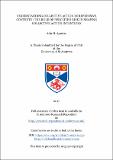Files in this item
Understanding collective action in repressive contexts : the role of perceived risk in shaping collective action intentions
Item metadata
| dc.contributor.advisor | Tausch, Nicole | |
| dc.contributor.author | Ayanian, Arin H. | |
| dc.coverage.spatial | xiii, 269 p. | en_US |
| dc.date.accessioned | 2017-02-22T10:35:55Z | |
| dc.date.available | 2017-02-22T10:35:55Z | |
| dc.date.issued | 2017-06-20 | |
| dc.identifier.uri | https://hdl.handle.net/10023/10332 | |
| dc.description.abstract | The aim of the present research is to advance a general predictive model of the social psychological processes underlying collective action in contexts where collective action is met with significant repression by the authorities. The model integrates the recent advancements in the collective action literature and examines the unique predictive role of anger and fear (emotional pathway), political, identity consolidation and participative efficacies (instrumental pathway), politicised identification (identity pathway) as well as moral obligation, over and above past participation. Moreover, the research investigates how perceived risk, due to government sanctions, shapes these antecedents and the willingness to engage in collective action. Five survey studies (Studies 1 to 5) test this model in various repressive contexts (i.e., Egypt, Hong Kong, Russia, Ukraine, and Turkey). In addition, one experimental study (Study 6) examines the causal relation between perceived risk and (a) the antecedents of collective action and (b) the action intentions in a British sample. The results confirm the intensifying role of perceived risk, whereby it indirectly spurs further resistance through shaping the antecedents of collective action. The results also suggest that protesters are intrinsically motivated to engage in collective action when placed under risk. Specifically, although not motivated by political efficacy, protesters are strategic as they are motivated by the likelihood to consolidate the identity of their protest movement and the likelihood of their own participation to incrementally contribute to achieving the desired goals. Moreover, they are emotional, politicised and dutiful as their outrage towards how the authorities treat the protesters, their identification with their protest movement, as well as their sense of moral responsibility encourage them to take action despite the risks. | en_US |
| dc.language.iso | en | en_US |
| dc.publisher | University of St Andrews | |
| dc.relation | Ayanian, A.H., & Tausch, N. (2016). How risk perception shapes collective action intentions in repressive contexts: A study of Egyptian activists during the 2013 post-coup uprising. British Journal of Social Psychology, 55(4), 700-721. DOI: 10.1111/bjso.12084 | en_US |
| dc.subject | Collective action | en_US |
| dc.subject | Risk | en_US |
| dc.subject | Identity | en_US |
| dc.subject | Moral obligation | en_US |
| dc.subject | Emotions | en_US |
| dc.subject | Efficacy beliefs | en_US |
| dc.subject.lcc | HM1101.A8 | |
| dc.subject.lcsh | Risk perception | en |
| dc.subject.lcsh | Risk--Sociological aspects | en |
| dc.subject.lcsh | Social action--Psychological aspects | en |
| dc.subject.lcsh | Identity (Psychology) | en |
| dc.subject.lcsh | Group identity | en |
| dc.title | Understanding collective action in repressive contexts : the role of perceived risk in shaping collective action intentions | en_US |
| dc.type | Thesis | en_US |
| dc.contributor.sponsor | University of St Andrews. School of Psychology and Neuroscience | en_US |
| dc.contributor.sponsor | International Center on Nonviolent Conflict | en_US |
| dc.type.qualificationlevel | Doctoral | en_US |
| dc.type.qualificationname | PhD Doctor of Philosophy | en_US |
| dc.publisher.institution | The University of St Andrews | en_US |
| dc.rights.embargoreason | Embargo period has ended, thesis made available in accordance with University regulations. | en |
| dc.identifier.doi | https://doi.org/10.17630/10023-10332 |
This item appears in the following Collection(s)
Items in the St Andrews Research Repository are protected by copyright, with all rights reserved, unless otherwise indicated.

